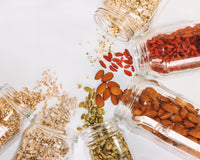The industrialisation of the food system, technology and globalisation have led to a transition in our food habits. The dietary patterns worldwide are becoming more processed and less diverse. Ultra-processed foods are now dominant in the global food supply.
Today, the UK population's diet is mainly made up of ultra-processed food. Statistics show that between 60 and 70 per cent of the average adult's diet is ultra-processed food.
What is the difference between processed and ultra-processed food?
Humans have been processing food since ancient times. Because food was precious for our ancestors, they developed natural methods and techniques to preserve food for longer and avoid food waste. They used to make flour out of grains, dry the fruits, ferment the veggies, and keep the meat in salt; all of that allowed the early humans to have food safe to consume for longer and available in winter months when they couldn't grow the crops. Today, we have an abundance of food; we buy too much of it, don't care about the quality, and sadly, we waste a lot.
There are three types of food: whole food (unprocessed), processed food and ultra-processed food.
Whole food is totally unprocessed real food like vegetables and fruits, milk, etc. Naturally processed food can be fermented vegetables (like kimchi or pickles); processed food is made with natural food ingredients, for example, butter made with milk, bread traditionally made with flour with no additives etc.
Real food is heavier, chewier, and in most cases, has fewer calories and makes you feel fuller for longer. You can enjoy eating many naturally processed foods as a part of a healthy diet. Products like canned vegetables, frozen fruits, some organic ready meals, dark chocolate, pasteurised yoghurts, fermented foods, and plant-based milk are very nutritious and healthy. What is ultra-processed food, then?
What is ultra-processed food?
Bread that is made with flour, salt, water, emulsifiers, sugar and preservatives is already an ultra-processed product.
According to the definition, ultra-processed foods are ready-to-eat or heat, packaged food formulations made by assembling manufactured ingredients and additives such as ingredients extracted from substances or synthesised in laboratories through multiple industrial processes. These include emulsifiers, stabilisers, softeners, flavour enhancers, sweeteners, preservatives, colourants etc. These ingredients are mixed together to create something edible that is food alike but lacks the integrity and nutrition of the real foods.
Think of the white and spongy light supermarket bread, full of sugar, salt and many other weird ingredients, packed in a plastic bag for months - this is the most popular ultra-processed food product in the UK. Sweetened or salty snacks, sweetened soft drinks, instant meals, meat slices, nuggets, hot dogs, cheese slices, sausages, pre-prepared pizzas, biscuits, crisps, candies, supermarket ice cream, flavoured breakfast cereals, sauces and dressings - these are ultra-processed foods.
How do you recognise ultra-processed food?
There are a few ways to spot ultra-processed items when shopping in the supermarket:
- Ultra-processed foods usually have a very long list of ingredients, with many additives and names of substances (often with numbers) you don't recognise and won't find in your kitchen cupboard.
- They are usually wrapped in plastic, contain preservatives and have very long expiry dates.
- Ultra-processed foods are less nutritious and naturally contain fewer fibre, vitamins and minerals - unless they are extra added.
- They contain a lot of sugar, fat and salt.
- These products are often lighter but with a high-calorie content.
- Brands and companies that sell these products aggressively promote these items in supermarkets, so you will see the ads everywhere around you. Have you ever seen an advertisement from a brand promoting carrots or broccoli?
How much of ultra-processed food do we eat?
Ultra-processed foods make up at least 60 per cent of a diet of an average UK consumer. It's even worse for kids - an average teenager consumes 70-80 per cent of their calories from ultra-processed food.
Why do we eat so much ultra-processed food?
Sadly, these foods are generally cheaper, making them attractive to consumers. However, most of the consumers don't know these foods are designed to make you want to eat more of them and more often. Ultra-processed foods are softer - softness is one of these traits that consumers like. These products contain a lot of added gluten, emulsifiers and stabilisers - mixed together make these products so soft.
This softness tricks our stomach - we eat so much of this food before our gut hormones realise and tell us we're full. The soft food is digested so early in the gut that it never even makes it to the bit of the gut that releases the hormones that will send you a signal to stop eating. Think of the burgers from McDonad's - aren't they super soft?
People who consume a lot of soft food have problems with weight management. That's because they tend to eat a lot more than they should, and they feel constantly hungry.
Usually, ultra-processed foods are lighter in weight than for example, whole foods, so you think you can afford to buy more of them, but they are energy dense and have a lot of sugar, meaning they have a lot more calories per weight. So after eating them, you get an energy spike and feel quickly satisfied, but not for long. After a couple of hours, you will feel hungry again - eventually, this ends up with you constantly feeling hungry and never really satisfied - and heading to eat more processed foods.
What are the side effects of eating ultra-processed foods?
In the long run, consuming ultra-processed foods leads to obesity and increases the risk of many diseases like diabetes, heart disease and cancer.
The additives in ultra-processed foods may have some effects on our brains and also on our gut microflora - they scrub out our guts of good bacteria, leaving us with harmful inflammatory bacteria.
What can we do to stop eating ultra-processed foods?
Reducing your consumption of highly processed foods packed with sugar, salt, and other chemical nasties will lead to improving your general health, so it's worth considering changing your food habits.
Here are a few tips on how to ditch ultra-processed foods:
- Before you go shopping, make a shopping list.
- While shopping, focus on your list and avoid buying heavily advertised items.
- Read the labels of the products and recognise the nasty ingredients.
- Eat more vegetables and fruits.
- Stop buying processed meats.
- Cook more often at home and get creative with your meals (look for healthy recipes online)
- If you have less time to cook, start meal prepping .
- Keep some healthy snacks in your kitchen cupboards (nuts, seeds and dried fruits)
- Replace refined grains with whole grains.
- Replace sweetened cereals with healthy cereals.
- Drink more water - stay hydrated.






